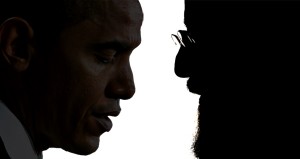 President Obama would be crazy not to seize the opportunity that Iranian President Hassan Rouhani has given him.
President Obama would be crazy not to seize the opportunity that Iranian President Hassan Rouhani has given him.President Obama would be crazy not to dive deep into diplomacy with Iran, right now. Forget the standard throat-clearing bromides and water-testing toe-dips that mark the resumption of relations with suspect characters. When the world�s leaders meet at the U.N. General Assembly next week, Obama should not only shake hands with Iranian President Hassan Rouhani but also meet with him privately, hand him a list of a dozen issues to discuss (uranium enrichment, sanctions, regional stability, etc.), and even be prepared to announce, if possible, a time and place for negotiations to begin and a roster of the delegates to be invited.
If Rouhani is who he claims to be�an Iranian moderate who has the authority to strike a bargain on nuclear programs and economic sanctions (at least until hardliners lose patience with him)�then this is an opportunity no Western leader can pass up.
If it�s all a ruse, or if the mullahs overrule whatever deal emerges, there�s no harm in trying. In fact, if things go bad and Western leaders feel compelled to respond with tighter sanctions or military action, they could do so with greater legitimacy after having given the high road a chance.
In any case, it does little good to sit around and debate the potential truth of Rouhani�s proclamations or the nature of Iranian politics, about which any outsider�s knowledge is limited. Rouhani has put his statements on the table. No Iranian president, in the entire revolutionary period, has said anything remotely this appealing. He has appointed, in Mohammad Javad Zarif, a foreign minister whose known views are consistent with these statements. Iran�s economy is in such a tailspin that the regime�including the mullahs who are ultimately in charge�may be willing to trade some things of value for an end to the U.S.-imposed sanctions.
History provides at best rough guides for action, a smattering of precedents from which hawks and doves can pluck �lessons� to bolster their cases. I remember the fierce debates, within the U.S. government and among outside experts, over whether Mikhail Gorbachev�s reforms were real or deceptive. A few decades earlier, similar arguments raged over Nikita Khrushchev�s stabs at d�tente. (In a mid-1964 issue of the U.S. Information Agency�s journal�Problems of Communism, the noted Kremlinologist William E. Griffith railed against a few scholars who�d detected internecine conflict within the Politburo and declared that Khrushchev�s grip on power was as tight as Stalin�s had ever been. Khrushchev was ousted by hardliners just weeks after the article was published.)
On the other hand, one could point to the determined efforts by Presidents George H.W. Bush and Bill Clinton to negotiate with Iranian leaders who spoke like reformers but whose policies were actually set, and whose hopeful rhetoric was ultimately overridden, by the mullahs.
Iranian-American relations have been gripped in a loopy psychodrama ever since 1953, when the CIA helped overthrow President Mohammad Mossadeq and install the Shah. In his 2004 book�The Persian Puzzle, Kenneth Pollack invoked the old saying �Just because you�re paranoid doesn�t mean that someone�s not out to get you,� and added that, in this case, the Iranians were right: �We were out to get them.� The dread was reciprocated in 1979 when Ayatollah Khomeini�s followers held American diplomats hostage in the U.S. Embassy.
And yet, even through this era, there have been moments of incipient rapprochement, most notably in the aftermath of the Sept. 11 attacks when Iran supplied the CIA with intelligence about al-Qaida. Relations gradually warmed, to the point where midlevel American and Iranian officials met for face-to-face talks about a variety of issues in Geneva. Then, in early 2002, just as relations were on the verge of warming, President George W. Bush delivered his State of the Union address, branding Iran, Iraq, and North Korea as an �axis of evil��at which point the Geneva talks ended and Iran stepped up its nuclear program.
By Slate
The Iran Project is not responsible for the content of quoted articles.










